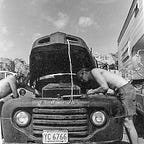This Day in History
November 19th
1873 — Boss Tweed convicted. William Tweed was a corrupt New York City politician, head of a Democratic political machine called Tammany Hall. He wielded influence in the 1850’s and 60’s, and pilfered government funds to the tune of tens of millions of dollars, and became the third largest landowner in New York City. He kept New York’s burgeoning Irish population in check which made him valuable to the city’s elite. He exercised control with force and by dispensing favors and money. One example, in the building of a courthouse, a carpenter was paid $360,000 for one month’s work.
Tweed was constantly under attack by cartoonists in New York papers and it infuriated him. They portrayed him as a corpulent figure with a huge diamond stickpin on his chest. He said he didn’t mind if negative things were written about him because most of his constituents couldn’t read, but the pictures were killing him. Tweed’s undoing continued with the Orange riot of 1871. He allowed an Irish Protestant parade to celebrate an Orange victory over the Catholics. A mob of Irish Catholics attacked the parade and in the ensuing riot sixty people were killed displeasing the city’s elite. Without their support investigations began of his corrupt practices. Convicted, he briefly escaped to Spain but was recaptured, extradited, and died in prison.
A corrupt politician going to prison, now there’s a trend I wouldn’t mind seeing continue.
1923 — Oklahoma state senate impeaches Governor John Walton. Walton had declared martial law in Oklahoma to combat Ku Klux Klan terrorism. To do this he suspended the writ of habeas corpus, which the state constitution forbid any government official to do. The crackdown inflamed the legislature, most of whom were members of the Klan. When first elected Walton ushered in some popular reforms designed to help farmers. He also supported education and instituted a program to give free textbooks to all Oklahoma school children. A true progressive, he also prosecuted companies ignoring state regulations and he increased spending on welfare. On the negative side he appointed family and friends to government posts, some of the positions being unnecessary. There were also suggestions he took bribes for political favors and his distractors accused him of Socialism. He made enough enemies in his short reign that the impeachment charges were easily passed.
It is uncertain what his greatest crime was, his role as a corrupt politician or being anti-Klan.
1984 — San Juanico, Mexico disaster. Located just outside Mexico City, a liquid petroleum gas farm experienced a series of explosions that killed 500–600 people, injured 5,000–7,000 more, and destroyed much of the town. A gas cloud from a leaked tank drifted into an open flame and exploded. Over the next twelve hours subsequent eruptions followed as gas tank after gas tank exploded. It has been recorded as one of the worst industrial accidents of all time.
If this was huge news in the U.S. at the time, I have no memory of reading about it. Hard to believe that such a catastrophic event escaped my notice. Maybe those in charge of what we need to know assigned it to a back page.
Birthdays:
1805 — Ferdinand de Lesseps. Builder of the Suez Canal. De Lesseps was a French diplomat who led the development of building a canal that connected the Red Sea and the Mediterranean. He later tried to copy that success by building a sea level canal across the Isthmus of Panama. Beset by disease (yellow fever and malaria) and corruption, the project was abandoned and later sold to the U.S government. In the aftermath of the failure, France prosecuted and convicted de Lesseps of misuse of funds.
I’ve read “Path Between the Seas” by David McCullough and he documents what began as a noble attempt by de Lesseps eventually turning into a huge Ponzi scheme.
1831 — James Garfield. 20th President of the United States. A successful Union general in the Civil War, Lincoln convinced him to resign his commission and run for the House of Representatives. Lincoln remarked that it was easier to find major generals than loyal Republican congressmen. From Ohio, he served nine terms in the House before winning the 1880 Republican nomination. His first order of business upon being elected was to fight corruption and bring back prestige to the Presidency. After only two hundred days in office he was assassinated.
The beginning of an effective presidency cut short by an assassin’s bullet. The great American tradition of bullets over brains, now backed by the NRA, goes back a long ways.
1938 — Ted Turner. Media mogul, billionaire and philanthropist, Turner founded the 24 hour TV news channel CNN. He also owns the Atlanta Braves baseball team.
Despite his charitable giving of untold millions to good causes, my image of him is more negative. In the 1991 World Series, inarguably the greatest World Series ever played, I remember him sitting in the stands, with his movie star wife, doing the racially offensive and insulting “tomahawk chop.” Justice was served, at least to me, in that the Minnesota Twins prevailed over the Atlanta Braves.
Sources:
wikipedia.org/
